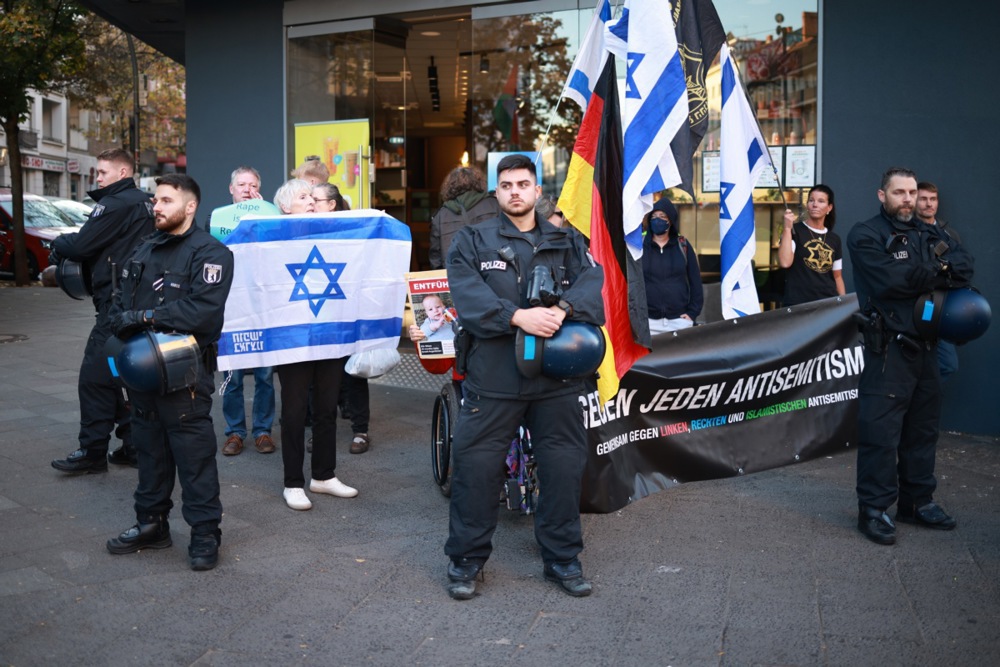According to a report by the Berlin Police, there has been a peak in hate-motivated crimes directed against homosexuals, bisexuals and trans people.
In 2014, there were 81 reported cases of hate-motivated crimes targeting LGBTQ individuals, and there has been “a continuous, uninterrupted trend” of trans and homophobic violence, according to numbers by the police.
By 2022, the recorded incidents had surged to 482, including 148 violent offences. In 2023, the trend continued, with 588 hate-motivated acts reported, 127 of which involved violence.
“There are no signs of a fundamental change in this dynamic,” noted the report, published on December 18.
Some 87.6 per cent of bi+ people surveyed said they had experienced assault or violence in public spaces.
The document suggested at least part of the rise in numbers might be connected to an increased willingness to report such incidents and an improvement in recording them.
In 2023, more than 45 per cent of the reported offences were categorised as insults, while 21 per cent involved bodily harm. Approximately 7 per cent each were cases of incitement to hatred and property damage and around 5 per cent were threats.
Additionally, the report said, about 12 per cent of the offences were attributed to “right-wing ideology”, around 3 per cent each to “religious ideology” and “foreign ideology” and 0.5 per cent to “left-wing” ideology.
The cases appeared to be highly localised, with 65.1 per cent of all police-recorded anti-LGBTQ offences in 2023 occurring in just nine of Berlin’s 97 neighbourhoods.
All those neighbourhoods have significant migrant populations although 70 per cent of the suspects identified for LGBTQ-hostile offences in 2023 had German citizenship.
In November, Barbara Slowik, head of the Berlin Police, said the city was “not safe” for people who were obviously Jewish or LGBTQ+.
Slowik urged such individuals to exercise caution in Arab-majority neighbourhoods.
Barbara Slowik, head of the Berlin police force, has said the city is not safe for people who were obviously Jewish or LGBTQ+. https://t.co/VaZBtWaZlj
— Brussels Signal (@brusselssignal) November 19, 2024
Despite the figures, many claim migration was not the real issue in this regard.
Reacting to Die Welt on December 18, Equality Senator Cansel Kiziltepe of the Socialist Party (SPD) said: “We observe hate crime in all groups that are on the ground here in Berlin.”
Regarding what was seen as an over-representation of Turkish, Syrian and Polish citizens in the figures, she said that was a “blanket statement”.
Alfonso Pantisano (SPD), Queer Berlin Liaison Officer in the governing Berlin Senate, told the newspaper: “I dream that one day I will be able to walk hand in hand with my partner in Marzahn-Hellersdorf without being attacked.”
There was also a consistent seasonal trend revealed in the report and cases typically spiked during summer months when more people were out in public spaces.
Some 92.4 per cent of suspects identified for alleged LGBTQ-motivated violent offences in 2023 were male.
Regarding age, such hate crime could no longer be put down to a phenomenon of youth delinquency in a broader sense, the report noted. Those offences were primarily committed by men but offenders came from all age groups.
In 2023, 78 per cent of suspects identified in connection with anti-LGBTQ offences were already known to the police from prior records.
Albrecht Lüter, responsible for the Berlin Police report, also downplayed the apparent over-representation of immigrants.
He said the distribution of the nationalities of the suspects was “in principle a reflection of the population structure in Berlin”.
The report was compiled by the Camino research institute on behalf of the Berlin Senate Department for Labour, Social Affairs, Equality, Integration, Diversity and Anti-Discrimination.
The data on hate-motivated crimes were so-called “input statistics”, reflecting initial suspicions rather than the outcomes of completed investigations.
The Freie Universität Berlin has decided a travelling exhibition on anti-Jewish pogroms cannot be exhibited in the university building, fearing an “emotional reaction” from students. https://t.co/TEXJkgzJe6
— Brussels Signal (@brusselssignal) December 12, 2024





